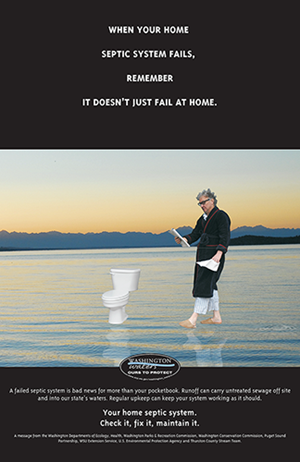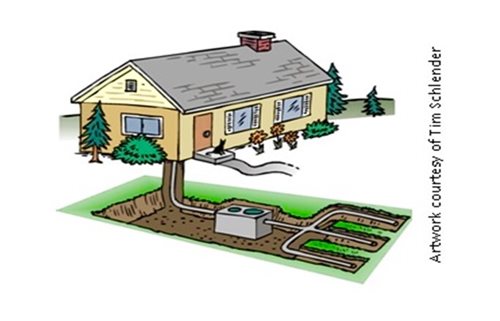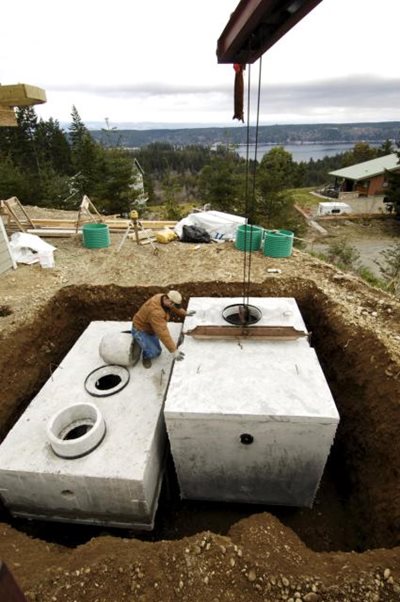Not only do you not have a place to — you know — go, you’ve got a smelly mess and it can cost you tens of thousands of dollars to fix the problem.
You are not alone. There are about a million privately owned and operated septic systems across Washington and many are at risk of failing due to old age.
Septic systems, or on-site sewage systems as we call them, are the suburban and rural counterpart to urban city sewer systems. Properly functioning systems are vital in protecting our health. They are also vital to protect clean, healthy groundwater and our lakes, rivers, streams and Puget Sound. And they are vital to local industries that depend on clean water to thrive.
Fully functioning septic systems provide sustainable infrastructure so people can live around Puget Sound without polluting it.
When your septic system fails, it’s a public health and an environmental problem
Whether it’s backing up in the basement, ponding in the backyard, or closing beaches, the bacteria and other contaminants associated with untreated sewage are a major water quality and public health concern.
Affordable loan program
For several years, the state departments of Health and Ecology partnered with local health jurisdictions and the local nonprofit lender Craft3 to provide financial assistance to help property owners fix failing systems and stay in their homes. They created highly affordable Clean Water Loans to cover the full costs of repairing or replacing failing septic systems, which are a significant burden to most household budgets.
What’s new is that a Puget Sound Regional Septic Program joined the Clean Water Loan program in July, giving Western Washington residents more access to the program.
“This new loan program exemplifies partnerships at their best. It responsibly invests in critical infrastructure, supports Puget Sound recovery, builds family resilience in rural areas, and helps ensure access to clean water that is essential to our communities,” said Polly Zehm, Ecology’s deputy director. “I’m thrilled to see counties, the state and Craft3 come together to strengthen local families and businesses, while making a measurable impact on our region’s water quality.”
• Septic system design
• Relevant permits
• Installation of the new septic system
• Ongoing maintenance
• Essential safety measures, such as those to prevent children from falling into septic tanks
• Or to connect to a municipal sewer system, if required
Are you eligible?
If you live in one of the following counties, you can apply for a Clean Water Loan from Craft3: Clallam, Grays Harbor, Jefferson, King, Kitsap, Mason, Pacific, Pierce, Snohomish, Thurston, Wahkiakum, and Whatcom. We also expect Island County to join the regional loan program soon.
If you live San Juan, Skagit or Spokane counties, funds are available through your local health jurisdiction.
It's SepticSmart Week, so take action by getting your system inspected, and if you need help, learn more about the Clean Water Loans at www.craft3.org/cleanwater
Visit our education website or the Environmental Protection Agency to learn more about keeping your septic system healthy.





